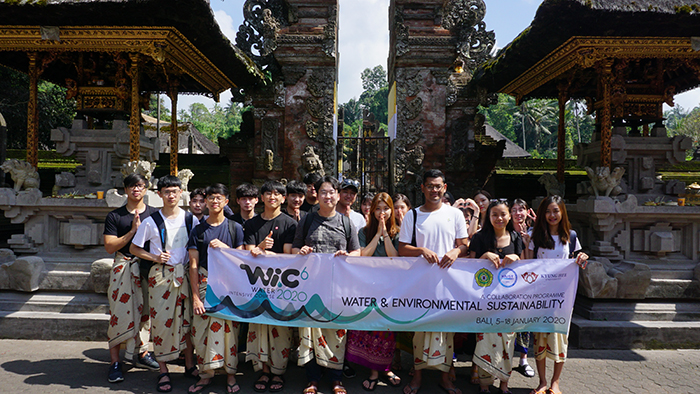CIVIL&ENVIRONMENTAL
ENGINEERING
WEBZINE2020 Vol.03, No.1Featured
Selamat Pagi Bali! (Means “good morning Bali!”)-
-
Hello Webzine! My name is Hyungseung Hahm. I am a 1st year master’s student studying Environmental Engineering. Two months ago, I attended a Water Intensive Course (WIC) in Bali, Indonesia sponsored by my lab and the Department of Civil and Environmental Engineering. WIC is a two-week-long collaborative workshop between KAIST, Kyung Hee University, and Universitas Katolik Parahyangan (UNPAR) to explore water resource management and protection issues that Indonesia faces.
True to the purpose of this workshop, the trip gave me first-hand experience with water quantity and quality problems. It was the rainy season when I arrived at Bali airport, and Jakarta was experiencing an enormous flood. Despite the abundance of rainwater, we were forbidden to drink tap water, nor dip into any natural body of water like streams and rivers. It was very rare to see clean water besides bottled water. Here, I realized that nature is a much stronger force to be reckoned with than in Korea.
Despite the rain, Bali was beautiful. It was the perfect place to escape the cold winter. With constant 28 degrees under the bright equator sun, my only regret was not packing enough summer clothes to endure the heat. I treasured the clean sky and lush forest, but the true highlight was the beach. The view of the mountain and the tropical forest touching the sea was so unique and peaceful. I also surfed for the first time in my life, and indulged in Indonesian food full of spices. The famous Rendang and Nasi Goreng deserved the “World’s Best Food” title awarded by CNN.
As much as I loved the food, the lectures in the workshop were great as well. From elementary reservoir sizing to complex water management strategies and coastline engineering, the lectures were not only in-depth but also very relatable to problems that the locals are facing. Each lecture always included how the subject we were studying was related to Indonesian water security, and ended with a discussion of how to solve these issues. As a goal-oriented person and engineering student, these activities motivated me and gave me a sense of purpose.
We went to explore the local culture as well. Visiting historical temples, landmarks, and traditional dances gave us a deeper understanding of the customs and lifestyle of the Balinese. Furthermore, we learned how to speak some basic Bahasa (the official Indonesian language) with the help of our UNPAR friends.
Our primary assignment was to develop a project proposal to solve water-related problems in Bali. We formed groups with members from each school to fully survey the issues that locals and governments are experiencing. Then, we developed unique strategies to overcome these issues with the great advice of our professors and engineers. My team won first place for our proposal and was awarded 1 million IDR, which we used to throw a big party to thank everyone who participated in the project.
This trip greatly motivated me in pursuing my field of study. It taught me how my work could have a great impact on people, especially in the developing world. Moreover, I gained a better insight into how to tackle a problem with engineering skills. Engineering is not only limited to mechanically solving an issue. It involves understanding the culture of the people to diagnose the causes of the issue, as well as to implement more effective and appropriate solutions. I felt that we did not waste a single moment of our trip during our rigorous daily schedule from 8am to 6pm. I thank my professor and the Department of Civil and Environmental Engineering for supporting our learning experience.
Continue to be bagus! (“good”)
-
Hello Webzine! My name is Hyungseung Hahm. I am a 1st year master’s student studying Environmental Engineering. Two months ago, I attended a Water Intensive Course (WIC) in Bali, Indonesia sponsored by my lab and the Department of Civil and Environmental Engineering. WIC is a two-week-long collaborative workshop between KAIST, Kyung Hee University, and Universitas Katolik Parahyangan (UNPAR) to explore water resource management and protection issues that Indonesia faces.




